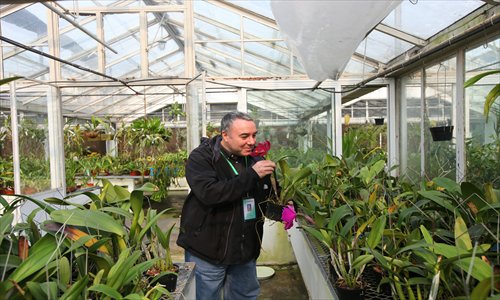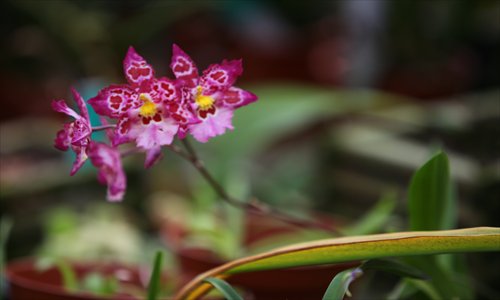

Elegant, exquisite, mysterious, and exotic: these are some of the most common words called to mind when people think of orchids. Unlike other plants with more simple charms, orchids have a reputation as being "intimidating," not only because they are difficult to grow, but also because of the sheer variety of the plant species and the high prices they can command.
To many flower lovers, orchids are like people in that they long for understanding and the right hands to take care of them.
And in the eyes of Alex Sánchez, an orchid curator from the Shanghai Botanical Garden, they are "tolerant and resilient" plants. "Once you start to grow them, it is a hobby you can never quit. It is addictive," Sánchez told the Global Times.
Free time
Sánchez, 45 and a father of two, moved to Shanghai some two years ago after his wife was assigned by her company to work in the city.
"Before leaving Spain to come to China, I was the co-owner of a successful, medium-sized advertising agency with a log of big customers. And for more than 20 years I have devoted every minute of my free time to orchids," he told the Global Times.
He developed his love for orchids from his grandfather who was also an orchid hobbyist and he started to grow his own plants at the age of 18.
Back in Spain, Shanchez had his own orchid nursery containing more than 800 different species, and for which he created an automatic watering system.
"Orchids are very clever plants in the sense that they are very adaptive to the environment in which they live," said Sánchez. "And they are able to attract pollinators for reproduction by such methods as scent and mimicry. Some of them give off sweet scents to attract bees, while others produce foul-smelling liquids to lure flies in to help with reproduction," he explained.
Sánchez points out that the key to growing orchids well is to try to duplicate the plant's natural conditions as closely as possible.
For some orchids which are epiphytes - meaning they grow on other objects - and which cling to rough bark or even stone, it is best not to let water accumulate in them, and to keep their roots dry, said Sánchez.
"Ventilation is the most important factor. You can keep an orchid without water for a month, some for three months, as some of them come from places that have very dry seasons. Without water, they can grow, but not flower. Proper ventilation is important in keeping the plant healthy," he added.
Experience and expertise
Currently, Sánchez is a member of the American Orchid Society and an honorary member of the Associaci Catalana d'Amics de les
Orqudies (The Catalonian Association of Friends of Orchids) in Spain.
And with all his experience and expertise, he wrote to the Shanghai Botanical Garden when he arrived in the city, offering his services.
Every morning he arrives at the orchid nursery in the gardens at 8 am.
"I look at the humidity and temperature, do the watering, and check the seeds to see how they're growing," he said of his daily tasks.
"I need to come in every day because, if at any moment the bed for the seeds turns yellow and the seed pod starts to open, then I need to bring them into the laboratory."
The lab is where Sánchez carries out his research and contains several shelves of "baby" orchids in glass bottles.
"Once I get the seeds, I put them in a special medium with certain chemicals, or with food for the seeds to grow into a small plant in the lab. It takes three years before the plant will actually flower. And you need a lot of patience to grow very rare species," he said.
Sánchez expressed his love for pure-breed species.
"You can always find hybrids very easily," he said. "However, the problem is that in some of these species, the flowers are not very nice. Some of these flowers are so small that you can barely see them! So they are not much use for people to grow at home."
With the care and devotion he has shown these orchids, many rare species have bloomed for the first time ever in Shanghai, according to his colleague Zhang Ruyao.
Labeling system
"He has classified different species of orchid with a labeling system. This is what we lacked when dealing with exotic species, which have long Latin names. They are very confusing for us. He is very helpful and we have learned a lot from him with regard to Western orchids," Zhang told the Global Times.
Sánchez pointed out that China today probably has the third highest amount of orchid species in the world.
He has also traveled to Yunnan Province as part of his work. "It is a paradise for orchid lovers like me. There are so many different species there. And in truth, there are many orchid species which are endangered by human exploitation and activities. I hope I can do something to preserve these species because it will be a pity to lose them. This project has been in my mind for some time, and in the future I hope I can realize it," he told the Global Times.
